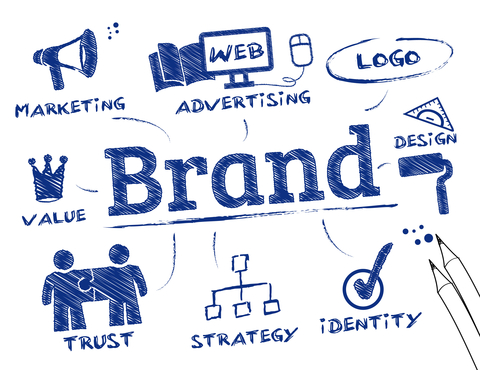
B2B Branding Strategy has two philosophies.
Some argue that corporate or product branding and positioning contribute most to increased sales and share of the market. Others believe that innovation and product improvements are the key to success.
While periodic tracking of such factors can shed light on this debate, many companies do not employ this technique at all.
A corollary of branding is brand awareness. It is not definitive to what extent a brand name impacts purchase decisions in the B2B world. When products and services need to be procured, there is generally a list of criteria that must be met, and these are often incorporated into proposals that are then sent to multiple vendors for bids. If most or all basic requirements are met, price can trump brand name as the decisive factor, especially if the item is perceived as a “commodity”.
There is some evidence to suggest that repeated exposure to a brand name can (subconsciously?) influence its selection over a lesser-known or unknown competitor’s. Since there is less reported research in the B2B marketplace, it is not clear whether branding is as effective as it is in the B2C environment.
What Is Branding Research?
Branding research is a specialized facet of market research aiming to understand, evaluate, and craft a brand’s image. It tries to unlock a brand’s unique proposition, and how it resonates with its target audience.
Branding research collects, analyzes, and interprets data related to a brand’s perception, performance, awareness, and differentiation in the market. It goes beyond just logos and taglines – it delves deep into how a brand emotionally and psychologically connects with consumers.
A variety of methods can be employed in branding research, ranging from surveys and focus groups to in-depth interviews and observational studies. The method chosen often depends on the research objectives and the depth of insight required.
Additionally, it can be used for multiple purposes:
- Brand Audit: Understanding the current position of the brand in the market.
- Competitive Analysis: Assessing how the brand stacks up against competitors.
- Brand Extension: Exploring opportunities to expand the brand into new areas or products.
- Rebranding: Determining the need and potential strategies for a brand overhaul.
… And much more.
Why Is It Important?
Branding research provides businesses with invaluable insights into their brand’s strengths, weaknesses, opportunities, and threats in the marketplace. It acts as a brand’s compass, ensuring alignment with the target audience’s values, desires, and needs.
Is the latest ad resonating with the audience? Does the new logo convey the brand’s essence? Such critical questions find their answers here – and branding research serves as a continuous feedback loop, offering several benefits for businesses, including:
• Deep Consumer Understanding: It helps brands discern not just what consumers think about them, but also why they feel a certain way. This rich context aids in creating messages that resonate on a personal level.
• Risk Mitigation: Research can serve as a testing ground. By gauging preliminary reactions, brands can preemptively identify potential pitfalls and successes, optimizing strategies accordingly.
• Tracking Brand Health: Branding research acts as a regular health check-up for a brand. By monitoring key performance indicators such as brand recall, awareness, and loyalty, businesses can take proactive measures to nurture and bolster their brand standing.
• Competitive Advantage: By understanding unique selling propositions and differentiators deeply, brands can position themselves distinctively, grabbing more than just a fleeting glance from potential customers.
• Strategic Decision-Making: Decision-makers can craft strategies with higher confidence. It offers a roadmap, pointing out when to push forward, when to pivot, and when to pause.
B2B Market Positioning
A brand should be positioned in the marketplace in such a way that it is clearly differentiated from its competition on one or more attributes, e.g. What does it do? How does it make one feel? Where does it fall on the price vs. quality continuum?
Marketing efforts should thus focus on making the market aware of your company’s or product’s unique position and benefits. Here are a few examples:
An integrated, multichannel approach, combining traditional with new media and interactive, social networking sites can be an effective means of reaching prospects and customers alike.
Different uses of email, digital and social media, SEO, SEM, websites and blogs can each reach specific targets with their own distinct messages.
B2B Brand Tracking
When setting up a brand tracking research study, consider these important criteria –
- what to measure (e.g. % aware of brand, attitude toward brand, # of leads, cost per lead, close rate, dollar sales)
- how to measure
- how frequently to measure (i.e. annually, every quarter, every other year)
The metrics chosen should be key indicators of brand strength and position, and consideration by potential buyers or influencers. Without tracking the right metrics, it is harder for B2B marketers to demonstrate any ROI nor prove their worth to upper management.
So develop a survey instrument with questions that will inform you of how well your brand is known, perceived, liked, etc., as well as how it compares to your primary competitors. A tracking study is different from many other kinds of research since it is intended to be performed more than one time, with a minimal number of changes. So give extra consideration to this when composing questions.
How to Conduct a Brand Tracking Research Study
Brand tracking research should include a representative sample of your prospects. This way, you will learn how your brand is perceived among potential customers as well as existing ones.
Try to obtain a sufficiently large sample size so that differences tracked over time are truly meaningful. This may present a challenge if the total market is relatively small or hard to reach. In such cases, the resources and experience of a professional third-party research firm can be extremely helpful.
In addition to mail, online, or phone surveys, another kind of tracking (such as trade show leads) may be performed with marketing automation software that can follow actions taken by prospects throughout a sales cycle. This allows you to see what events or messages yield better quality leads and conversions.
How Frequently to Track
It is important to remember that changing brand perceptions takes time. Tracking studies allow you to measure and fully appreciate branding efforts.
- If your products are in a dynamic market (e.g. technology, telecommunications), you may find yourself making changes to your products and marketing messages more often and thus want to track more frequently.
- If your sales cycle is quite long, branding and positioning efforts probably need more time to show their impact.
In general, B2B and industrial market sales cycles tend to be long — often 6 months or more. For example, tracking the number of sales made immediately after a trade show, event, or download from your website isn’t a true indication of the value of that marketing activity. So while someone may become a lead at a trade show, they may only convert into a customer at a much later date.
Emerging Trends in Branding Research
Branding research is constantly evolving, keeping pace with technological advancements, cultural shifts, and changes in consumer behavior. Here are some of the emerging trends that are shaping the future of this type of research:
• Digital Ethnography: With a significant portion of consumers now living a considerable part of their lives online, Research is diving deep into digital ethnography. This method deciphers consumer behavior on digital platforms, allowing brands to understand the digital touchpoints that influence consumers.
• AI and Predictive Analytics: Artificial Intelligence is reshaping branding research. With the capability to sift through and analyze vast datasets swiftly, AI tools offer predictive insights, allowing brands to forecast and strategize based on future trends rather than just historical data.
• Real-time Brand Tracking: With the rise of digital media and instant feedback mechanisms, research is moving towards real-time brand tracking. Brands can now get immediate feedback on campaigns, launches, or any other initiatives, allowing them to tweak strategies in real-time.
• Cultural Proximity: As brands become global, there’s a growing need to understand local cultures, nuances, and sentiments. Branding research is increasingly focusing on cultural insights, ensuring that brands resonate locally while communicating a global message.
Opportunities in Branding Research
Branding research offers a goldmine of opportunities for businesses, no matter their size or sector – and here’s how it can be a game-changer for businesses:
• Understanding Consumer Psyche: Research provides a window into the consumer’s mind. By comprehending what drives brand loyalty, businesses can tailor their strategies to foster deeper connections with their audience.
• Product Development and Innovation: Businesses can understand gaps in the market or unmet consumer needs. This can guide the innovation pipeline, ensuring product developments are in line with brand values and consumer expectations.
• Enhanced Competitive Edge: Branding research offers a comprehensive view of the competitive landscape, allowing businesses to identify opportunities for differentiation and areas where they can gain a competitive advantage.
• Global Expansion: For businesses eyeing global markets, it provides insights into cultural nuances, preferences, and perceptions, ensuring that the brand’s global strategy is culturally sensitive and locally relevant.
Challenges of Branding Research
While the potential of branding research is vast, businesses do face certain challenges when conducting this research – and here’s a deeper look into some hurdles companies might encounter:
• Subjectivity: One of the inherent challenges of branding research is the subjective nature of brand perceptions. Unlike quantitative data, qualitative insights from this research demand nuanced interpretation and a deeper understanding.
• Cost Implications: Comprehensive branding research can represent an important investment. While the returns are often worth the investment, smaller businesses might find it daunting to allocate significant budgets to assess the global perception of the brand in multiple markets.
• Choosing the Right Methodology: With an array of research methods available, determining the most suitable one for specific branding queries can be challenging. An incorrect choice can skew results and lead to misguided strategies.
• Global Challenges: Conducting research across multiple countries, cultural differences can pose challenges, and it demands a heightened level of expertise and sensitivity.
• Integrating Insights: Once research is conducted, integrating its insights into actionable strategies demands seamless collaboration between research teams, marketing departments, and other stakeholders. Ensuring everyone is on the same page can sometimes be a hurdle.
Strategic Considerations
Many B2B marketers do not track ROI at all. They may be flying blind, relying more on instinct and luck to succeed.
If you are willing to examine what works, and what needs improvement in your branding and positioning strategies, it is well worthwhile implementing a brand tracking mechanism. It need not be a drain on resources and can be a vital tool to measure how you are performing and help to demonstrate your value to the C-suite.



